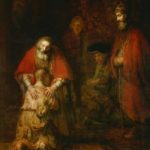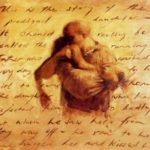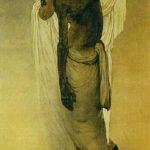
So, a dear man died one week ago. Dave, to his students (because he preferred this), and Dr David Dorsey, PhD officially. On Tuesday the chapel was packed for his funeral as hundreds resolutely braved sub zero wind chill to pay respects, support his family, share memories and express their sadness at the loss. For us who remain in this world and knew him the hole of his absence hurts. It actually feels painful.

If I tried to tell you all the things that I loved about my former Old Testament Professor, or the countless benefits to me, or the simple and genuine ways he loved on me and others, I would be typing for days. Suffice it to say just about everyone on Tuesday was in tears and everyone felt the weight of the loss as we remembered his light in this world.
In the next few weeks I hope to share some of the insights I gleaned from this amazing scholar and human being.
For now, I’ll share with you something Dave taught us about faith. Granted, I won’t do it justice; and if you read this and heard differently from him, please add your own amend in the comments section.
So, here goes…
He said the faith of the patriarchs of Israel might not be the kind of faith we suppose it is. Hebrews 11 gives us a “Hall of Fame” of the faithful. We may think that these people trusted and relied on God. They did. But we get the pedigree of it all wrong. The practice of faith is much richer than we might suppose, especially at first glance reading the list of the faithful.
Instead, it’s something like this:
Faith is not about being hopeful about what lies beyond the bend in the future. It not really about a “blind” ascension to trust either. Those are good and important in their ways, but when we speak of the life of faith in terms of the Old Testament faithful, like Abraham leaving everything he knew for the wilderness for instance, we are really talking about a concept much like “putting all your eggs in one basket.”
That’s how Dave put it. The word picture stuck and it stuck good.
With the Life of Faith…
You are deeming God good, trustworthy, and loving and then you put it all on the line.
(So, it’s rarer than you think!)
You stop hedging your bets. You stop saving a little security for yourself. You stop holding something back that gives you a sense of control. You bet the whole thing. You leave nothing back. You. go. in. wholly.
Sometimes, I find eggs in my pockets, or around the house, or in places that I didn’t know they were, like a weird easter egg hunt. Not chicken eggs, of course, but the eggs of my worries. I may have thought I handed the basket over, and perhaps I really did, but life can make you lay a few eggs. Sometimes people throw them at you too.
Faith, Hope, Love. Those are what remain, yes?
Faith = a Basket of Eggs.
It’s a shocking level of vulnerability: the life of faith.
You can tell when you do it too. You get a mixture of feelings. Great relief that your job is over, your poor skills are not needed any longer, and someone more capable is now responsible and in charge. Whew! Then, you may get a twinge of terror at the power you gave up, but probably never really had anyway. You become all at once very hopeful and very dependent. It’s precarious.
There’s a rare beauty to it.
Sometimes we give up our baskets and sometimes they sort of get pried out of our hands.
Dave was gravely ill for over 3 decades. His was a life of faith. It had to be. And he handed over eggs.
It was a wrestle match, he would tell you. He didn’t always feel faithful. He made mistakes. His candor was humbling. But, through his honesty he became faithful all the more.
There’s something about growing to trust God for each breath, and believing that God revealed himself as a thoroughly good and gracious and generous Creator and Sustainer in the passages of the Old Testament that transformed this brilliant man into a true saint. Not sappy, but real. All at once very strong and stable and yet achingly weak.
Dave was not self-righteous but gracious. Not arrogant in any discernible manner, but loving and open to others. Concerned with others and their lives and largely uncomplaining. Free with his humor and goodwill.
Hear this: You don’t get the privilege to meet people like this very often. You don’t get to be a person like this often. It’s takes an amazing about of formation, re-formation, and transformation. It doesn’t happen by accident or by genetics.
A life of faith means that you hold nothing back. See the difference?
It’s not using power to feel better. It’s giving it over to be fully won over.
In a life of faith you love whole-heartedly. Not because it’s safe. It never is. But, because it is good. A life of faith means that you have a sharp, ongoing sense of your own weaknesses and dependence, and that goes overflowing into compassion for yourself and others.
A few days after Dave’s death I was praying in the car out loud as I do sometimes. (I take more comfort in doing this now. People talk on the phone hands-free all the time in their cars and look like they are talking to nobody. Now, I just look like I’m having an important conversation. In fact, I am, especially when I shut up.)
So, I was in the car and I was warring as I too often do with things in the distance. Shadows, possibilities, next steps. I was planning, wondering, and worrying–like I was holding a bunch of eggs and walking on a lake of ice.
And then I said, “No, this just won’t work. I see I’m holding too tightly. I think I have to go all in. I have to have faith. I have to put all my eggs in one basket. Your basket.”
And a song sung by Ella Fitzgerald came to mind. I’ve embedded the audio so you can hear it after you finish.
Then I simply burst into tears, because that’s what a godly and good legacy looks like. Literally, one leaves words to live by. Dave’s words of life and hope and faith were ringing true in my mind in everyday life, even after he’s gone. And I thought, “That’s an amazing man and I was given an amazing gift to know him.” I kept having to wipe away tears for awhile.
Spirit, you know, is “breath of life”. (The Hebrew and Greek words for breath carry this meaning.) God is Spirit. When you see goodness, when you see sacrificial love, when you see wrongs being made right, you see God. You see the Spirit of the unseen God. Those describers are just part of what and who is impossible to confine or describe fully.
God isn’t just Life Force, but God is that too. And I don’t think Dave lost his own spirit or the Spirit. I think God became greater. The Spirit got so great that it filled him, and his body of water and carbon gave out, finally. It birthed something new and better and unseen and lasting.
And this Spirit and the part of Dave that is Dave (his truest self–his soul) joined up in union with the Great Spirit, somewhere and everywhere, the One, True, Living God who defies reason, explanation, and the limits of us, and even of the universe.
But, Dave didn’t completely leave us. But, my does the sting smart, right now! From my experience I know it dulls in time; but the pain is, at first, ultimate.
Yet, the fragrance of his spirit remains. And it is sweet.
It’s around us when we remember him. The Spirit remains, and Dave’s flavor fused with that true Spirit carries on with us. We miss the more familiar everyday interaction with him so dearly, and always will, until the same happens to us and we are joined somehow together again.
To those who grieve him: his family and friends, I join you in your deep and powerful sorrow. I join you in your joy–that is bitter and sweet–that realizes the gift he was–having known him, been enriched by him, and been intimately connected to him. Your loss is not small.
May you feel the comfort, presence, shalom, and holy goodness of the Spirit of God.
Amen.
-Lisa
P.S.
Here is a brief local obituary posting of David A. Dorsey.
With these links you can enjoy two of his most well-known books:
(egg photo is a Creative Commons image.)


![Thoughts from Meister Eckhart [SSL110]](https://lisadelay.com/blog/wp-content/uploads/2018/10/Screen-Shot-2018-10-16-at-12.00.25-PM-e1539787990232.png)





